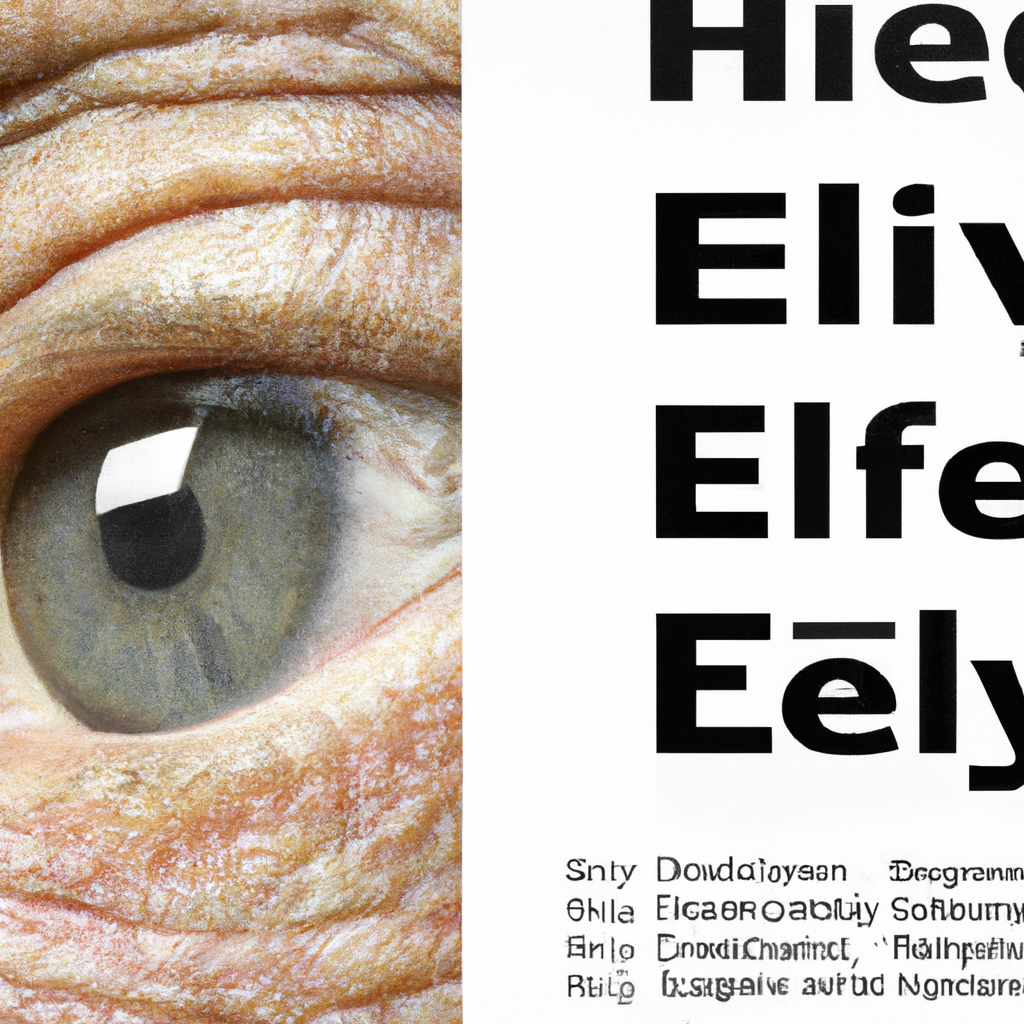The sight of an elderly person is no less precious than that of a person of any age. As we get older, our eyesight and eye health can become more difficult to maintain, requiring more frequent doctor visits to check for conditions like cataracts and glaucoma. By monitoring vision and eye care, however, we can ensure our elderly loved ones have optimal eye health. This article will explore elderly vision and eye health, and will provide advice for maintaining good eye health during older age.
1) Safeguarding Sight for the Elderly: A Primer on Eye Care
Caring for your eye health becomes more important as you age. As an elderly adult, taking steps to maintain healthy eyesight is essential to staying independent and living life to the fullest. Here’s a primer on how you can safeguard your sight.
Essential Eye Exams
If you’re an elderly adult, regular eye exams are the best way to diagnose and prevent vision problems. Some eye diseases such as glaucoma or age-related disorders do not produce noticeable symptoms, so it’s even more important to get regular checkups. Your eye doctor can inform you about any changes in your vision and outline a plan of action for any necessary treatment.
Nutrition for Healthy Eyes
Maintaining a healthy diet that includes certain vitamins and minerals is beneficial for your eyesight. In particular, a diet high in lutein, omega-3 fatty acids, and antioxidants like Vitamin A and C are key for eye health. Adding more dark leafy vegetables, nuts, and eggs to your meals can help you get the nutrition your eyes need. Additionally, quitting smoking and limiting your alcohol consumption is important for prevening vision decline.
Protective Eyewear
Depending on your lifestyle, protective eyewear may be a must for safeguarding your vision. Wearing sunglasses to block out ultraviolet rays is important to keep your eyes healthy. Likewise, if you’re working in a dusty environment or around other potentially hazardous materials, protective eyeglasses or goggles should be worn at all times. It’s also a good idea to discourage your children and grandchildren from taking part in activities such as paintball without wearing safety eyewear.
Rest & Relaxation
After a long day, do your eyes – and mind – a favor by taking some time to rest and relax. Appropriate rest helps to reduce eye strain and fatigue. Give your eyes a break from screens and books – take a walk outside, listen to calming music, or do another activity you enjoy. Balancing your daily activities with periods of rest is important for overall eye health.
2) Aging Eyes: How to Recognize Common Vision Changes
It’s normal for vision to start to decline as you get older. While it’s not usually a cause for alarm, it’s important to keep an eye out for signs that a visit to the optometrist is in order. Here’s a look at what to watch for when it comes to common vision changes due to aging:
- Blurred Vision: If you’ve noticed that objects, even at arms length, seem to be a bit fuzzy or unclear, it is likely a sign of diminishing vision. If it is difficult to read even the largest of print sizes, your eyes may be experiencing the normal decline of age.
- Hazy Colors: Do you find that colors appear to be unusually dull, or that you have difficulty identifying certain shades? If so, it could be an indication that vision is getting worse over time.
- Fatigued Eyes: Working on a task that was previously easy can be more challenging if your eyes are feeling fatigued more often. Changes to sight can affect how quickly your eyes become tired.
Other signs to watch for include losing your place while reading, squinting to see clearly, or struggling to focus on objects at a distance. While it’s normal for vision to change with age, it’s important to recognize when it does and seek proper medical attention from a trusted optometrist.
Having correct vision helps you stay independent and engaged in activities you may otherwise not have access to. Even if your vision decline is normal, it’s important to stay on top of regular check-ups and to de-stress and protect your eyes in any way possible.
3) Eye Care Programs: Providing Comprehensive Eye Health Solutions
It is important to remember that many eye health problems are easily treated and even preventable. That’s why eye care programs are becoming increasingly popular, offering comprehensive solutions for a range of outpatient care related to eye diseases, from laser surgery to vision screenings.
By providing full eye health services, eye care programs enable individuals to be proactive in eye disease prevention. The comprehensive approach of these programs includes comprehensive eye exams, cataract surgery, glaucoma care, glaucoma tests, and cataract evaluations. Additionally, these programs frequently offer a range of treatment options, such as optometry services for contact lenses and glasses, vision therapy, eye muscle exercises and eye drops.
What’s more, many eye care programs also provide health and wellness programs to patients, such as nutrition counseling, stress management, exercise programs, and lifestyle classes. With the help of these programs, individuals can make an active effort to improve their vision health.
- Disease Prevention – Eye care programs monitor individuals for any treatable eye diseases and offer treatment options.
- Long-Term Care – Eye care programs are a part of a long-term plan of care and education, so patients can make informed decisions about their vision health.
- Risk Reduction – Eye care programs also provide risk-reducing measures for individuals at risk of developing eye diseases.
Eye care programs can also provide education on ways to reduce the risk of vision problems and health problems associated with eye disease. Today, more and more people are taking the initiative to ensure their own eye health with the help of comprehensive eye care programs.
4) Keeping a Watchful Eye: Evaluating the Need for Vision Treatment
Gone are the days when the world appeared merely a haze of various shapes and sizes – while vision can be taken for granted, those with deteriorating or impaired vision face daily hurdles that are often overlooked in terms of addressing their health issues. And while there are constantly advancements being made in vision treatments, locating a professional to evaluate the exact needs for someone with lifelong vision impairments can be more difficult than desired.
First things first, it’s essential to not only have a regular eye examination to measure your vision strength and record any changes in vision health, but also to opt for a comprehensive eye exam with a retina imaging if you are having any eye-related troubles at all. If the exam reveals any abnormalities or disease related to the eyes, then your healthcare provider or ophthalmologist may construct a vision treatment plan depending on their prognosis.
In terms of types of vision treatments, these can range from:
- Glasses and Contacts: Commonly used for treating vision impairments such as near- or far-sightedness, as well as astigmatism.
- Laser Eye Surgery: Used for vision correction within extensive ranges, appointments and recovery can be lengthy processes.
- Vitrectomy: Involves surgically removing and replacing a portion of the vitreous humor of the eye to preserve vision.
Finally, you may need to research a variety of vision therapy treatments to determine which is best suited for you. Physical therapists, behavior optometrists, and developmental optometrists are all capable of evaluating the eye and your comprehensive vision health to create the ideal treatment plan for you.
As we age, our ability to see, take in visual stimuli, and even move our eyes change drastically. While it is important to adequately monitor your vision and eye health as you get older, it is also essential to seek the guidance of a qualified eye specialist, to ensure proper eye care throughout your transitioning years. Don’t let age affect your quality of life – keep your eyesight as sharp and steady as possible. This is a vision worth fighting for.



